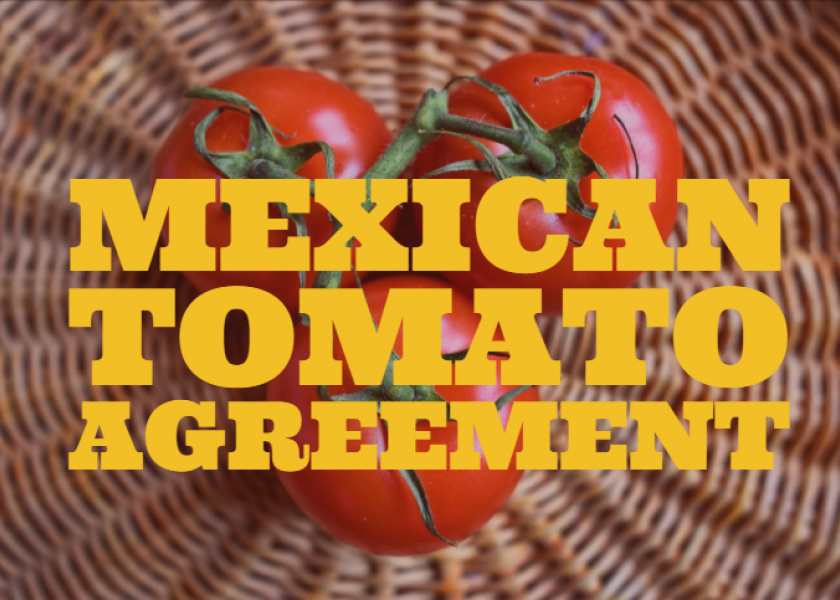Hope fades for quick resolution as tomato lawsuits filed

The possibility persists for a new tomato suspension agreement between the Commerce Department and Mexican growers, but hopes for a quick resolution have been doused.
A week after the 2013 tomato suspension agreement was terminated May 7 and an anti-dumping investigation was resumed by the Commerce Department, negotiations failed to resolve outstanding issues.
U.S. importers of Mexican tomatoes are paying an anti-dumping duty of 17.56%, although shipping point prices for Mexican tomatoes, as reported by the U.S. Department of Agriculture, did not markedly change from May 7 to May 16.
A Commerce Department proposal for a new suspension agreement was rejected May 10 by the Mexican growers. At the same time, the growers are seeking an injunction in the U.S. Court of International Trade in New York against the Commerce Department’s termination of the suspension agreement and the requirement for cash deposits for importers for the anti-dumping duty.
The case is expected to be heard June 16, Shearman & Sterling counsel Robert LaRussa said. The firm represents the Mexican growers in the filing.
“If we win the hearing, then we’ll have an injunction stopping them from putting those cash deposits into effect, and stopping the investigation from going forward,” he said. “If we lose the injunction — injunctions are difficult to get — we’ll still have a lawsuit there.” If no suspension agreement is reached, and barring other legal developments, LaRussa said the International Trade Commission will eventually have to determine if there is injury resulting from Mexican tomatoes entering the U.S. That decision may occur by September, he said. If the ITC finds Mexican tomatoes have not caused injury, he said the result will be a free market on Mexican tomatoes, with no duties and no suspension agreement.
Even so, LaRussa said Mexican growers hope to negotiate a new suspension agreement, “but it has to be fair.”
Clashing views
Mexican import interests and Florida tomato industry leaders shared widely contrasting views on a Commerce Department proposal rejected by Mexican growers May 10.
The Fresh Produce Association of the Americas in a news release urged the Department of Commerce to continue to work with the Mexican growers, and said that any agreement must “stay within the scope of the law.”
FPAA said in the release that the Florida Tomato Exchange continues to ask for protections that would result in conditions that make it economically risky for U.S. buyers to import Mexican tomatoes by compromising buyers’ ability to reject a load of Mexican tomatoes.
LaRussa said the Commerce Department provision would mean Mexican growers would have to agree to strip the ability of U.S. buyers — whether they’re supermarkets or distributors — to use their legal rights under the Perishable Agricultural Commodities Act situations where there are condition defects in tomato shipments.
The Florida Tomato Exchange said in a news release that the May 10 Commerce Department “take it or leave it” proposal also included concessions by the U.S. industry.
“Sadly, the Mexican industry rejected the proposed terms and is now complaining that the Commerce Department’s proposal contained unlawful demands,” the statement said. “This, of course, is posturing because the Commerce Department doesn’t make unlawful proposals.”
The Florida Tomato Exchange said the Commerce Department proposal would allow price adjustments for both condition and quality, which the group said “would actually provide more rights to U.S. buyers of Mexican tomatoes.”
“The old agreement created an incentive for growers and distributors of Mexican tomatoes to game the agreement’s price adjustment system by shipping product they knew would not make USDA good delivery standards on arrival,” the release said.
“The Commerce proposal would eliminate this loophole by preventing tomatoes that don’t pass USDA inspection from being used as price deductions against the cost of tomatoes that do pass inspection, thereby lowering the price below the suspension agreement minimums.”
The release said it is “incorrect” to think that this provision would have any impact on U.S. supermarkets or consumers.
“The market window isn’t there like it used to be. This is 100% due to supply from Mexico,” Fred Leitz, a vine-ripened tomato grower in Michigan, said in the release. “Our costs are going up and our prices are going down. I sold tomatoes cheaper last year than I’ve sold in probably 10 years.”
Another grower said the suspension agreement in place since 1996 wasn’t working.
"As someone who grows tomatoes in both the U.S. and Mexico, I’ve witnessed firsthand the failure of the suspension agreement over the last 20 years,” Jon Esformes of Sunripe Certified Brands, said in the release. The firm grows tomatoes in Virginia, Georgia, Florida and Mexico. “The circumvention of the agreement hurts domestic farmers and frankly hurts Mexican growers who abide by both the letter and spirit of the law. Any new suspension agreement must have much tougher enforcement and inspection provisions.”
Jason Klinowski, a food and agriculture attorney with Wallace, Jordan, Ratliff & Brandt, said the trade was just learning to deal with the 17.56% anti-dumping duty on Mexican tomatoes.
Some, he said, are finding it is not as daunting as they thought and possibly easier than trying to deal with all the various indexes of the suspension agreement.
Greenhouse grower NatureSweet, San Antonio, is asking the Commerce Department for some exemptions on duties for its imported tomatoes grown in Mexico, on the basis they did not exist when those duties were originally set.
In a May 8 request to Commerce for a “scope ruling,” the company claims that many varieties it grows were not even created when the Commerce Department began a dumping investigation on Mexican tomatoes in 1996.
Related articles
NatureSweet ask relief on dumping duties
Mexican tomato agreement done, duties kick in







